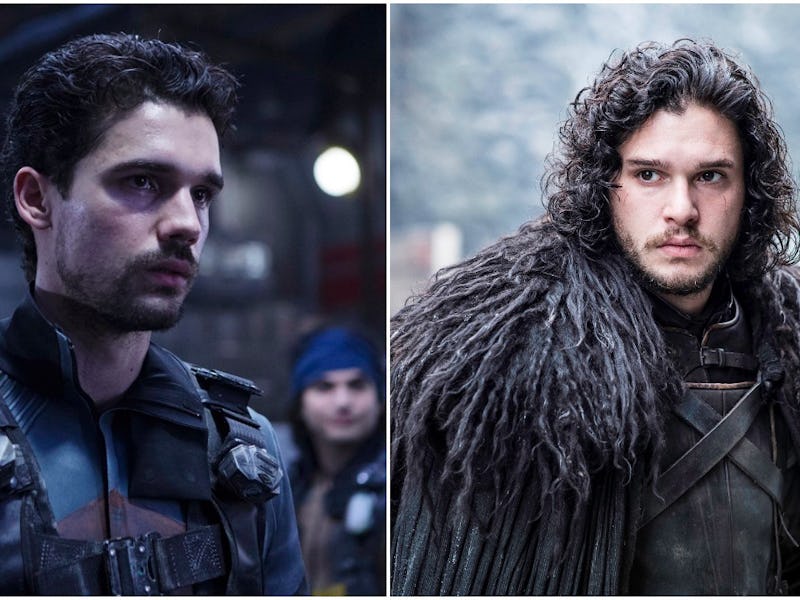'The Expanse' Is Still 'Game of Thrones' in Space, and That's Awesome
Forget Westeros. Give us Mars, the U.N., and the Belt.

Syfy’s space opera series The Expanse heads into its Season 2 premiere as one of the most under-appreciated shows on television. But now it has an opportunity to establish itself with audiences currently lacking a sprawling character drama in a fantastical setting, as Game of Thrones’s seventh season is still over a year and a half away. Fans of the drama in Westeros, here’s why you should check out The Expanse.
Unrelated-Related Narratives
The brewing solar system-wide war is the overarching narrative on every character’s mind in The Expanse. The conspiracy started with the destruction of a space freighter called the Canterbury and ended with the survivors discovering that it may have gone down due to Earth’s experimenting with some kind of alien life form bio-weapon. The particulars have absolutely nothing to do with Game of Thrones, but like the HBO series, The Expanse allows its overarching and unrelated storylines to develop through various character strains.
Arya Stark may be doing her thing in Braavos on one side of the world while her half-brother Jon Snow is trying to maintain order at the Wall on the other. They may not even interact with each other for multiple seasons. But in the end, they’re all trying to figure out how to unite and get their kingdom back. It’s the same with The Expanse as events swirl around a Martian warship and a distant outpost on an asteroid belt in response to decisions made by politicians far away. At some point, they will all start to come together.
Vivid World-Building
Creating a universe that is fantastical, but still believable, is no easy task. Both Game of Thrones and The Expanse wisely pull from various texts and references to make their worlds and concepts a bit easier to comprehend (GoT is like sexy Lord of the Rings and The Expanse is like a brighter, less surly Blade Runner). But they don’t shy away from pushing audiences immediately into their universes, sans obvious exposition dumps.
The pilot episode of Game of Thrones opens with a White Walker attacking a sentry guard with no explanation whatsoever. Julie Mao’s cold-open in The Expanse pilot is similarly disorienting. But each gives viewers more than just the basic episode-to-episode plot. Small details like the Belter patois and the stiff upper lip of Martian commandos say more about what it must be like living day to day than any character simply telling you would.
There’s no playing catch-up; it’s all about keeping-up.
The Not-Lead Character
Casting such a wide narrative net should lead to main character troubles, but the strong ensemble of each show allows for heroes and villains to emerge naturally. There are obvious mustache-twirling bad guys skulking around. King Joffrey reveled in being a sniveling regal reprobate in his short time on GoT. Julie Maos’s still mysterious father is most obviously the puppet-master of the whole bio-weapon scheme. But the more interesting opposite is how the shows define their protagonists.
Most of the characters on both shows have ambiguous motivations, which can turn on a dime based on their allegiances at any given moment. Bastard zombie Jon Snow has come into view as the virtuous leader of man and beast alike, a role he learned as a stand-up guy. While he isn’t there quite yet, the moral fortitude of The Expanse’s Jim Holden has forced him to become the reluctant leader of the crew of the wayward ship Rocinante. The dude just wants to live and work mining for ice on asteroids in peace. Even though it isn’t easy, he’s going to find out why he and his friends were nearly blown up for no good reason. He’s the protagonist because he’s the good guy in this episode, but you continue to watch to see if he might do something to subvert that in the next episode.
An Otherworldly Threat
The most essential part of the strong overarching narratives of Game of Thrones and The Expanse involve some sort of supernatural or inexplicable force disrupting everything. The specter of Julie Mao hovers over Season 1 and Season 2 of The Expanse even though she’s found dead in the first season’s penultimate episode. Her ghost opens up even more divisive and inexplicable events because of her involvement in the bio-weapon found by Holden and the Rocinante crew.
Details are hinted at, and characters keep talking about them, but most importantly, that simmering gives you a better perspective on the world without really knowing the full extent of what’s happening. You can’t really explain what the White Walkers are at this point in Game of Thrones, but you know that “Winter is coming.” Every time down-and-out former detective Joe Miller looks at his prized photo of Julie, or Holden has a nightmare about the bio-weapon, we know something is coming.